Related Research Articles
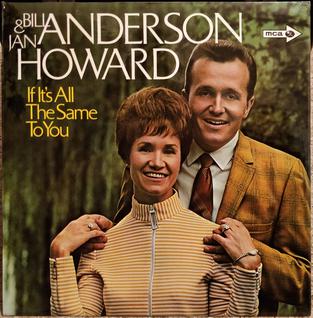
If It's All the Same to You is a studio album by American country music artists Bill Anderson and Jan Howard. The album was released on Decca Records in March 1970 and was produced by Owen Bradley. It was the pair's second collaborative album after several years of performing together on tour and on television. The album's title track became a major hit on the Billboard country chart, reaching the top 10. Additionally, the album itself would reach peak positions on the Billboard country albums chart.
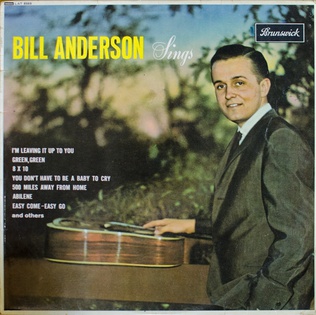
Bill Anderson Sings is a studio album by American country singer-songwriter Bill Anderson. It was released in February 1964 on Decca Records and was produced by Owen Bradley. The album was Anderson's second studio release as a recording artist and included two singles that became major hits on the Billboard country chart. The album itself would also reach positions on the Billboard charts following its release.
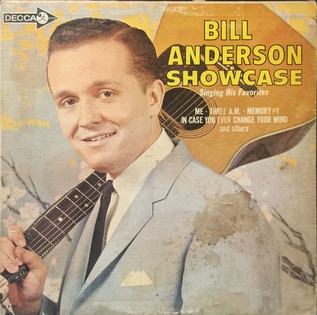
Showcase is a studio album by American country singer-songwriter Bill Anderson. It was released in November 1964 on Decca Records and was produced by Owen Bradley. The album was Anderson's third studio release as a recording artist and second to be released in 1964. It included two singles that became major hits on the Billboard country chart along with subsequent B-sides.

Bright Lights and Country Music is a studio album by Bill Anderson and the Po' Boys. It was released in November 1965 on Decca Records and was produced by Owen Bradley. It was Anderson's first studio album to include dual credit with his band, The Po' Boys. It was his fourth studio album overall. The album included one single release, the title track. This song became a major hit on the Billboard country charts. The album itself also reached charting positions on Billboard shortly after its release.

I Love You Drops is a studio album by American country singer-songwriter Bill Anderson. It was released in August 1966 on Decca Records and was produced by Owen Bradley. It was Anderson's fifth studio release and included three singles that became major hits on the Billboard country chart. The album would also become a success on the Billboard country albums list upon its release, becoming one of his most successful charting albums.

Wild Weekend is a studio album by American country singer-songwriter Bill Anderson. It was released in May 1968 on Decca Records and was produced by Owen Bradley. The record was Anderson's ninth studio release to be issued during his recording career. It reached peak positions on the Billboard country albums chart and also produced two singles that became major hits.
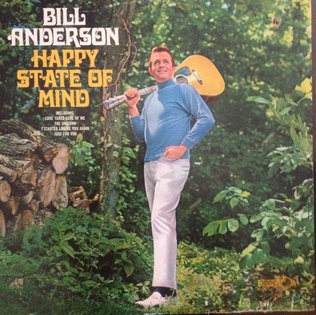
Happy State of Mind is a studio album by American country singer-songwriter Bill Anderson. It was released in September 1968 on Decca Records and was produced by Owen Bradley. Anderson's tenth studio recording, it was also his second studio album released in 1968. Among the songs included on the release was the title track, which became a major hit in both the United States and Canada.
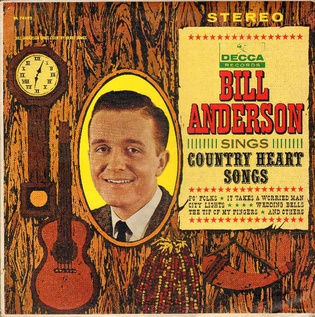
Bill Anderson Sings Country Heart Songs is a compilation album by American country singer-songwriter Bill Anderson. It was released in January 1962 on Decca Records and was produced by Owen Bradley. Despite it being a compilation, the project was Anderson's debut album release as a recording artist. It featured several of his early hits with the Decca label and included one song that would later be issued as a single in 1962.

From This Pen is a compilation album by American country music singer-songwriter Bill Anderson. It was released in June 1965 via Decca Records in several sessions produced by Owen Bradley. It was Anderson's second compilation released during his career and contained songs that he had recorded since his signing with the label. Many of the songs featured were major hits for Anderson in preceding years.
"That's What It's Like to Be Lonesome" is a song written and recorded by American country singer-songwriter Bill Anderson. It was released as a single in December 1958 via Decca Records and became a major hit. A similar version was released by American country artist Ray Price the same year via Columbia Records.
"8×10" is a song written by Bill Anderson and Walter Haynes. It was first recorded by American country singer-songwriter Bill Anderson. It was released as a single in 1963 via Decca Records and became a major hit.
"Me" is a song written by Alex Zanetis that was first recorded by American country singer-songwriter Bill Anderson. It was released as a single in 1964 via Decca Records and became a major hit.
"Three A.M." is a song written by Bill Anderson and Jerry Todd. It was first recorded by its co-writer, Bill Anderson. It was released as a single in 1964 via Decca Records and became a major hit.
"Certain" is a song written and first recorded by American country singer-songwriter Bill Anderson. It was released as a single in 1965 via Decca Records and became a major hit.
"I Love You Drops" is a song written and first recorded by American country singer-songwriter Bill Anderson. It was released as a single in 1965 via Decca Records and became a major hit.
"Get While the Gettin's Good" is a song written by Ted Cooper and Steve Karliski. It was first recorded by American country singer-songwriter Bill Anderson. It was released as a single in 1967 via Decca Records and became a major hit.
"Love Is a Sometimes Thing" is a song written by Jan Howard. It was first recorded by American country singer-songwriter Bill Anderson. It was released as a single in 1970 via Decca Records and became a major hit the same year.
"Where Have All Our Heroes Gone" is a song written and first recorded by American country singer-songwriter Bill Anderson. It was also co-composed with Bob Talbert. It was released as a single in 1970 via Decca Records and became a major hit the same year.
"Always Remember" is a song written by Jerry Bradley and Patsy Lawley. It was first recorded by American country singer-songwriter Bill Anderson. It was released as a single in 1971 via Decca Records and became a major hit the same year.
"Golden Guitar" is a song written by Billy Gray and Curtis Leach. It was first recorded by American country singer-songwriter Bill Anderson. It was released as a single in 1965 via Decca Records and became a major hit.
References
- ↑ "Bright Lights and Country Music: Bill Anderson: Songs, Reviews, Credits". Allmusic . Retrieved 22 July 2020.
- 1 2 Anderson, Bill (November 1965). "Bright Lights and Country Music (Album Information and Liner Notes)". Decca Records .
- ↑ Whitburn, Joel (2008). Hot Country Songs 1944 to 2008. Record Research, Inc. ISBN 978-0-89820-177-2.
- ↑ ""Bright Lights and Country Music" chart history". Billboard . Retrieved 22 July 2020.
- ↑ "Bill Anderson -- "Bright Lights and Country Music" (1965, Vinyl)". Discogs . 1965. Retrieved 22 July 2020.
- ↑ "Bill Anderson Chart History (Hot Country Songs)". Billboard. Retrieved July 22, 2020.